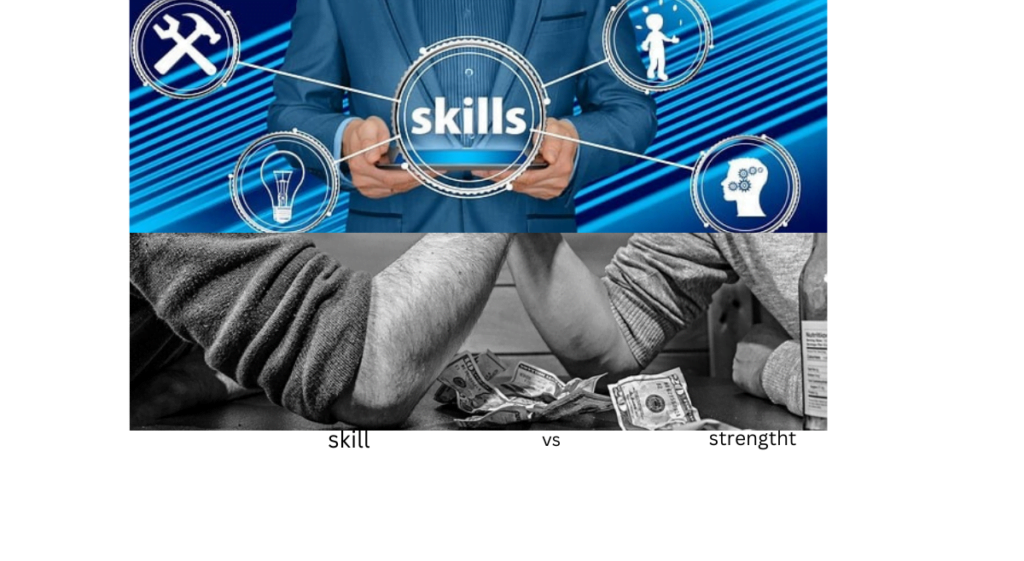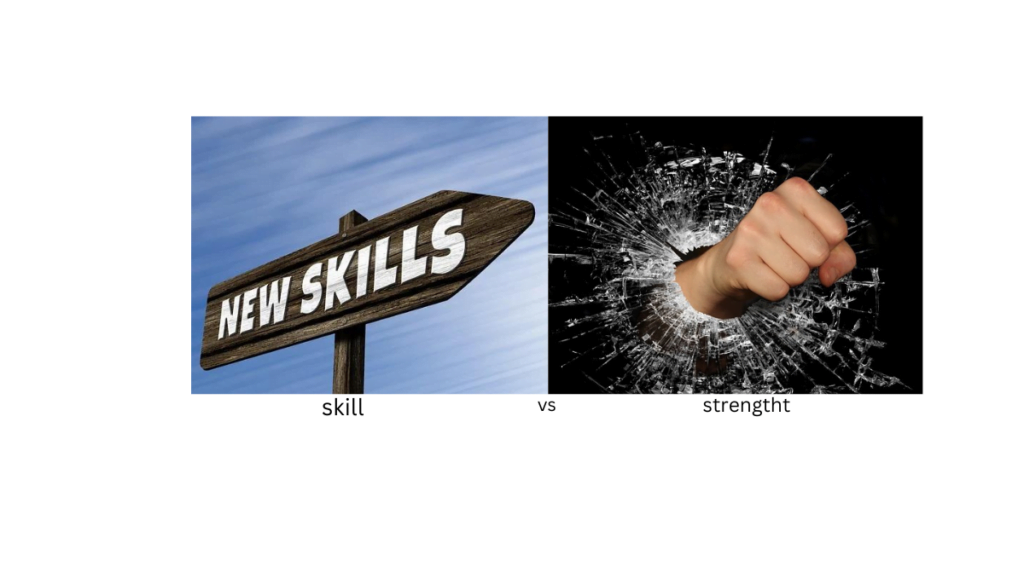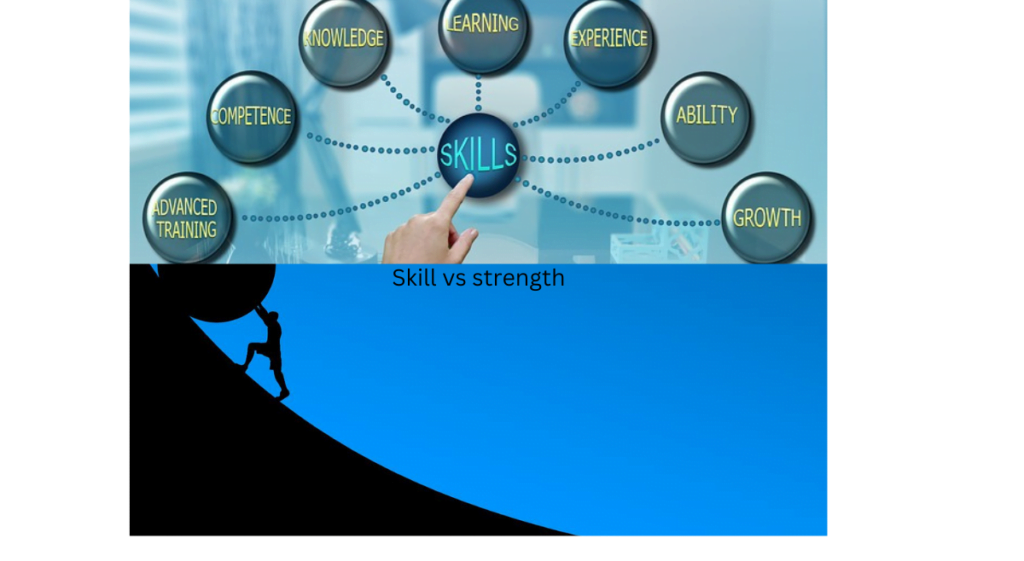Introduction:-
The Power Parity: Skill vs Strength in Focus

In the quest for success, in whatever domain it may be, the age-old debate persists: is it skill or strength that truly determines one’s power and potential? This question transcends boundaries, from the world of sports to the workplace, and even into our personal lives. Understanding the dynamics between skill and strength is essential, as it can shape our path towards achievement and fulfillment. In this exploration, we will delve into this intriguing power equation, dissecting the roles of skill and strength and how they intertwine to define our capabilities.
Why is it crucial to grasp the interplay between skill vs strength, and how does this understanding influence the direction of our journey towards achievement and fulfillment?
Defining Skill and Strength:

Before we embark on this journey, let’s clarify our terms. Skill can be broadly understood as expertise or proficiency acquired through practice, learning, and experience. It is often associated with the ability to perform a task, solve a problem, or accomplish a goal with precision and finesse. On the other hand, strength refers to physical or mental power and the capacity to exert force or endure challenges. It represents raw, innate potential.
The Dichotomy of Skill vs Strength:
In many scenarios, skill and strength appear to be in opposition. Consider, for instance, the classic case of a weightlifting competition versus a chess match. The weightlifter relies primarily on brute strength, whereas the chess player depends on strategic thinking and skill. It’s evident that different endeavors require a varying mix of these attributes.
The Skill-Centric Approach:
In numerous professions and activities, skill takes the lead. Take, for example, the world of music. A skilled musician can create harmonious melodies with mastery over their chosen instrument, even if they are not particularly physically strong. Likewise, in the corporate realm, strategic planning, problem-solving, and effective communication are skills that often hold more sway than physical strength.
Skill is often the product of continuous learning and practice. Think of an artist who refines their technique over years of painting, a surgeon who hones their skills through countless surgeries, or a programmer who becomes a coding virtuoso through consistent effort. In these cases, strength plays a secondary role, if any, in achieving success.
The Strength-Centric Approach:
On the flip side, there are situations where sheer strength prevails. In sports like powerlifting or competitive bodybuilding, physical strength is paramount. Even in professions that require manual labor, like construction or agriculture, strength is a critical factor. In such cases, skill can certainly enhance performance, but without a solid foundation of strength, success remains elusive.
However, it’s essential to note that even in strength-centric domains, skill plays a role. Professional athletes, for instance, employ techniques and strategies honed through rigorous training and practice. It’s the harmonious blend of skill and strength that often propels them to the highest echelons of their sport.
The Symbiosis of Skill and Strength:
The truth is, the dichotomy between skill and strength is not as clear-cut as it might seem. Instead of being opposites, they often exist in a symbiotic relationship. Consider a skilled carpenter who combines their knowledge of woodwork with physical strength to construct beautiful, sturdy furniture. Or a professional pianist whose nimble fingers are guided by years of training and practice but are also sustained by physical endurance.
Furthermore, in the workplace, the most successful individuals are often those who strike a balance between skill and strength. Leadership, for instance, requires both the skill of understanding people and the strength to make tough decisions. Similarly, entrepreneurship demands a blend of innovative thinking (skill) and resilience in the face of adversity (strength).
The Importance of Context:
The relative importance of skill and strength also depends on the context. In some situations, skill may be the primary determinant of success, while in others, it might be strength. For example, in a job interview, your skills, qualifications, and ability to articulate your ideas might be the deciding factors. In contrast, in a physically demanding job, your ability to perform tasks safely and effectively may hinge more on your strength and stamina.
Striking the Balance:
So, where does this leave us in the skill vs strength debate? The key lies in understanding that it’s not an “either-or” scenario. Rather, it’s about recognizing when each attribute is most valuable and harnessing them accordingly.
- Self-awareness: Start by understanding your own strengths and weaknesses. Are you naturally inclined towards a particular skill, or do you possess physical strength that can be leveraged in specific areas? Knowing yourself is the first step towards maximizing your potential.
- Continuous improvement: Regardless of your natural talents, both skill and strength can be developed and refined. Commit to lifelong learning and personal growth. Whether it’s through education, training, or exercise, there is always room for improvement.
- Adaptability: In a rapidly changing world, adaptability is a skill in itself. Embrace change and be willing to pivot between skill and strength as the situation demands. The most successful individuals are those who can adjust their approach to fit the context.
- Collaboration: Recognize that no one person possesses all the skills and strengths required for every situation. Collaboration and teamwork allow individuals to complement each other’s abilities, creating a stronger collective force.
- Resilience: Both skill and strength will be tested through challenges and setbacks. Developing mental and emotional resilience is crucial to persevere in the face of adversity.
Is skill stronger than strength?
The comparison between skill and strength is not a matter of one being inherently stronger than the other; rather, it depends on the context and the specific task or goal at hand. Skill and strength have different roles and contributions, and their relative importance varies in different situations.

- Skill refers to expertise or proficiency acquired through practice, learning, and experience. It often involves precision, finesse, and efficiency in performing a task. Skill is vital in areas where technique, knowledge, and experience are paramount. For example, in professions like surgery, art, or computer programming, skill plays a dominant role in determining success.
- Strength, on the other hand, relates to physical or mental power and the capacity to exert force or endure challenges. Strength is essential in tasks or activities that require physical prowess or the ability to withstand demanding conditions. In sports like weightlifting or competitive bodybuilding, physical strength is paramount.
The importance of skill and strength also depends on the specific context and goals. In some situations, skill may be the primary determinant of success, while in others, strength may take precedence. The synergy between skill and strength often leads to the best outcomes.
In essence, it’s not about skill being inherently stronger than strength or vice versa; rather, it’s about recognizing when each attribute is most valuable and harnessing them accordingly. The combination of skill and strength can be a powerful force in achieving a wide range of goals and aspirations.
Conclusion:
In the end, the power equation between skill and strength is not a simple arithmetic problem with a fixed solution. It’s a dynamic, ever-changing formula that varies with context, goals, and individual attributes. The most successful individuals are those who can adapt, cultivate both skill and strength, and use them harmoniously to tackle life’s myriad challenges. Instead of pitting skill against strength, let us recognize that true power lies in their synergy, unlocking our full potential and propelling us toward success.
https://youtu.be/BTXik0UUIT0?si=t-EfC1ANcoPJE4eN





